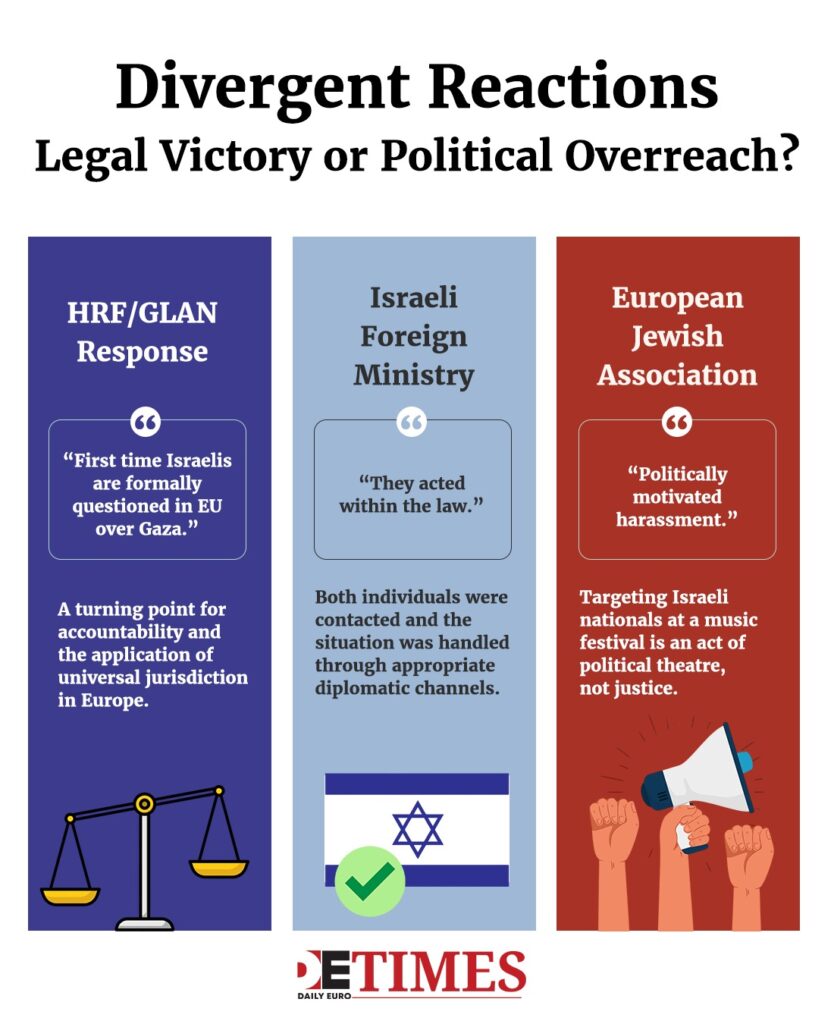In July 2025, an unusual incident occurred at one of the largest electronic music festivals in the world, Tomorrowland in Boom, Belgium.
Belgian law enforcement officers arrived at the festival, later detaining two Israeli citizens. Enforcement officers were suspected of involvement in war crimes in the Gaza Strip.
The Story of the Arrests:
Two Israeli men visited Tomorrowland, but were stopped and interrogated by Belgian police.
Hind Rajab Foundation and Global Legal Action Network filed an urgent complaint, stating that they are suspected of violating international humanitarian law in Gaza.
According to the Israeli Foreign Ministry, one of the detainees was an active soldier whilst the other a civilian. However, the Belgian prosecutor's office named two individuals, both of whom were soldiers.
The men were interrogated and later released. At the moment, the official case is ongoing, but no charges have been brought.
How Significant are the Charges?
Belgium introduced a law on universal jurisdiction in 2023, allowing the prosecution of serious crimes such as war crimes, even if they are committed outside the shores of the state.
This is the first time that such a mechanism has been applied to Israeli representatives in Europe.
HRF called it a “turning point” in the fight against impunity, stressing that the organisation itself has succeeded in filing complaints in 10 countries. This concerns hundreds of individuals.
Official Reactions: Human Rights Advocacy
HRF and GLAN view the incident as an important legal victory:
"For the first time in Europe, Israeli suspects in Gaza crimes have been formally questioned."
Israel said the participants “acted within the law,” assuring that both individuals had been contacted and the situation had been resolved.
The European Jewish Association expressed dissatisfaction, calling the investigation politically motivated.
The arrest is complicated by the overall humanitarian catastrophe in Gaza.
According to the latest data, the death toll exceeds 59,000 people, mostly civilians. These figures increase pressure on international legal control mechanisms.

International Investigations: Israeli Exceptionalism Until 2023
Despite numerous accusations of violating international humanitarian law, Israel has rarely faced real consequences from international courts.
In 2009, the International Criminal Court received its first complaint against Israel's actions in Gaza, but the case was suspended due to lack of jurisdiction.
It was not until 2021 that the ICC formally opened an investigation into possible crimes in Palestine, including the actions of Hamas and Israel. However, political pressure and Israel’s refusal to recognise the court’s jurisdiction has undermined tangible progress.
Since 2023, the situation has started to shift: an increase in independent complaints, the development of universal jurisdiction, and the work of NGOs have increased pressure on the military and politicians.
The interrogation of Israelis in Belgium this year is the first of such case in the EU.
Legal Side
The Belgian prosecutor’s office acted on the basis of the Berne Convention of 1949 and the UN Convention against Torture (1984).
The complaints of HRF and GLAN were based on publications and photos from social networks, where the detainees were allegedly holding the flag of the Givati Brigade, a unit accused of mass destruction in Gaza.
To date, no charges have been brought, but a criminal investigation has been officially launched.
Precedent Significance
1. Jurisdictional Development Vector: Such actions signal the willingness of European countries to apply international law.
2. Risk Detection: Israeli military personnel traveling abroad now face greater legal liability.
3. HRF Effect: Growing influence of human rights organizations tracking conflict participants through social media posts.
Tomorrowland has become an important precedent for the application of universal jurisdiction and international humanitarian law. The application demonstrates that even in an informal setting, like a music festival, serious legal actions can unfold.
The increased activity of human rights organisations, the strengthening of digital monitoring, and the political will of individual countries signals a drastic change in the approach to issues of accountability for war crimes.
Despite the lack of formal charges, the process of criminal investigatory action in EU states is a significant step forward in accountability, justice, and prosecution for crimes that transcend borders.
This could become a turning point in the fight against impunity in global legal practice.
Read the Latest Articles on DET!
Logistical Connections: Russia and North Korea are Building New Routes
Hungary and Slovakia: EU Veto as a Double Edged Sword





